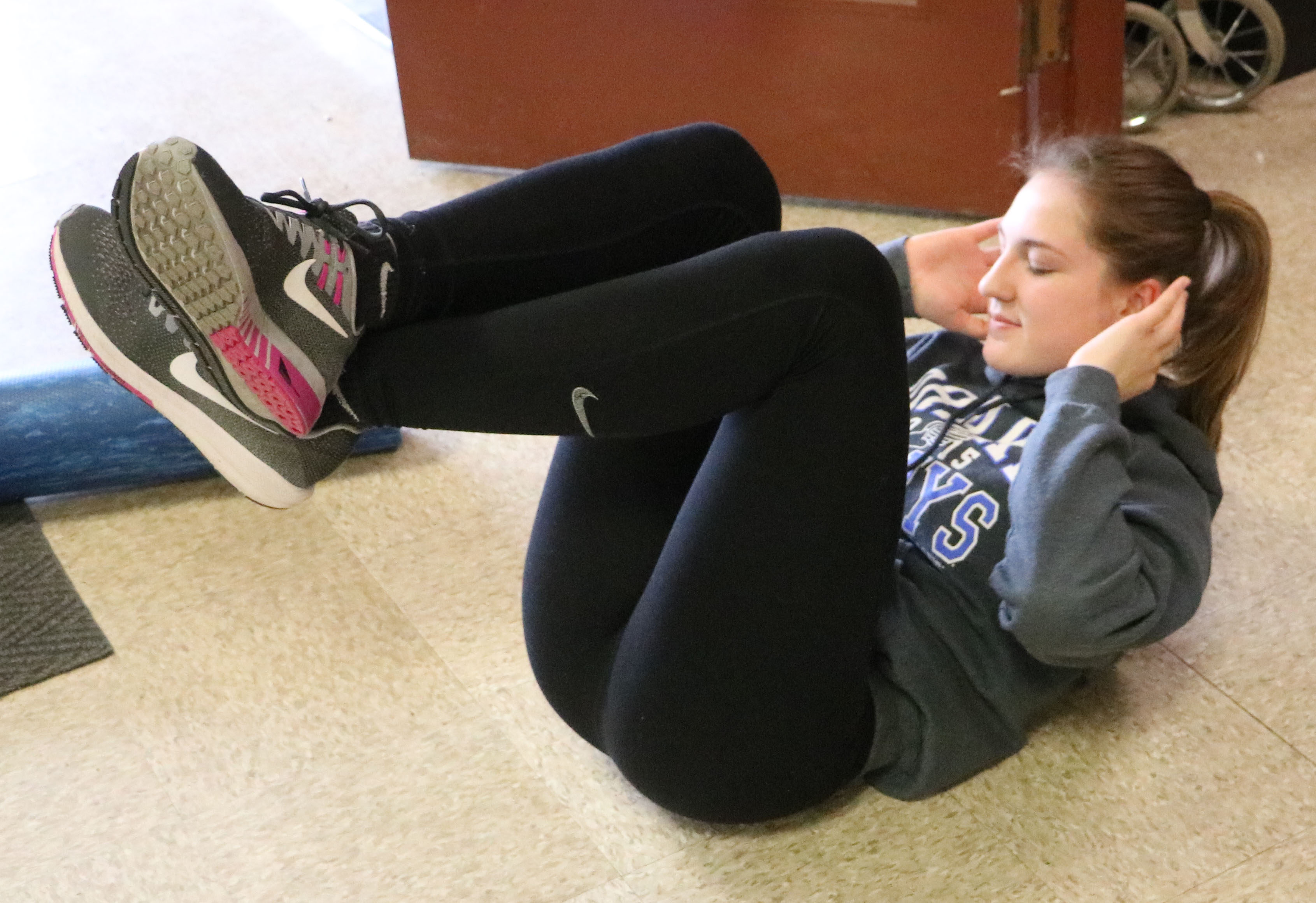Top athletes wrestle with dividing dedications
By Staff Writers Sophia Schillinger and Jibreel Bailey

Senior Makenzie Nichols finds time to work out after school recently. She and many athletes balance school, practices, social commitments, jobs, homework, sleep, family and more in an effort to stay on top of their “games.”
Jumping out of bed at 5:45, grabbing a quick breakfast and heading to an early morning weight lifting session may sound like hell for the majority of teens. Add on two hours of practice for a sport after having a seven-hour school day, and one will get a dedicated but insane student athlete.
High school sports are known for their intensity, some more than others, yes, but they all push athletes to the max. All of the sports have different ways of training and different schedules, but they all have one thing in common, one is going to have to dedicate one’s life to them, physically and mentally.
Summer Pieters is a senior at Cedar Falls High School where she is part of the dance team. She also dances throughout the year with Fusion Dance and Fitness. Pieter dedicates 25-30 hours a week to dance, spending two to six hours a day training and practicing. “I spend 10 hours taking dance classes and learning skills in a dance classroom, seven hours as an assistant dance teacher where I am basically just taking more class as an older student for younger students to look up to and during the dance team season I would practice four-10 hours a week. I also usually practice, review and do extra workouts to improve everything I did during the dance week for about two-five hours a week depending on the intensity of what is going on during that time,” Pieters said.
Pieter’s mind has grown tremendously strong from such dedication to dance and pushing herself week after week. “I have seen a difference in my mental strength, for sure. I have a more positive and determined outlook on what I can handle and on how I approach tasks in and out of dance. I also feel like I am learning and focusing in a better manner now than I was a few years ago thanks to dance and workouts for dance,” Pieters said.
Getting done with a workout or practice drains Pieter’s energy by about 100 percent, but the feeling of knowing what her body can do right after completing goals fuels Pieters with so much good feelings and energy. “I am totally exhausted after dance, but I can do other tasks after practice because usually my endorphins and happy feelings keep me energized for a while,” Pieters said.
Dedicated athletes are special and very hard to find, but one knows they have found one when the athlete does more than what the coach or teacher requires. “I practice the skills I am taught outside of the set class or practice times. I also do lots of yoga, and I have my own workout routine of running and various arm and ab exercises that I do a few times a week,” Pieters said.
For her, being an athlete takes sacrifice as one might miss going out to the movies with friends or staying up until 1 a.m. dancing because of practice or a competition the next day. However, athletes strive to keep focused on the goals they have set for themselves and how they are going to get there. Over the years Pieters has adjusted to her busy dance schedule and accepted missing Wednesday night church group and drinking “insane amounts of coffee.”
She has concluded that following her hectic dance schedule was the right thing to do, because she was recently accepted into the dance major program at University of Iowa. “I will be dancing every day for the next four years and rigorously training in various disciplines of dance. I hope to dance professionally and open a dance studio after college, but we’ll see what happens,” Pieters said.
AJ Green is a junior basketball player at Cedar Falls High School and is another athlete that reaps the benefits of dedication. “There have been lots of things that I have had to give up like hanging out with my friends or going to fun events. I know that I have to do this if I want to be good. Pretty much everything I do is scheduled around my sport,” Green said.
Green spends about two hours a day playing basketball and believes that it is “what you put into the hours, not how many you put in.”
Green also lifts four days a week and participates in agility training to work on quickness and jumping.
He is able to stay physically strong through his tough weekly schedule with protein shakes and smoothies, but for mental toughness, he uses something else. “Since I started basketball I have seen a difference in my mental strength because I have learned that when you get tired, you can always do more, or when you don’t feel like practicing you have to be mentally tough and do it in order to get where you want to be,” Green said. He also uses the sport of fishing as a relaxing and fun activity.
For top athletes, dedication is something they have to work hard at. For senior track runner Makenzie Nichols, she does have doubting thoughts sometimes. With a heavy homework load and hard practices, she said one sometimes can just snap.
“I actually think about quitting all the time. It is those times where I can’t go and do something I really wanted to because of a meet or practice that are especially difficult. There are times where I am so stressed out because of my homework piling up, and I am so tired from practice. In those times I remind myself of how much I enjoy the sport. When I remember my love for track, I get away from wanting to quit. It is always a great thought to take the easy way out and quit, but I like the feeling of being challenged,” Nichols said.
Nichols’ love for track has only grown throughout the years and is now an all year affair. “I spend all year prepping for track. I do early morning workouts. In the summer I can sometimes do three workouts a day as off season conditioning for track,” Nichols said.
Not only is she preparing her body for the intense track season, but she is preparing her mind and attitude. “I focus a lot of my energy on track. I am constantly prepping for practice or for a meet. I have to focus my eating and sleeping habits around track to make sure my body is ready for another workout. I am always thinking about the next workout or how to make myself a better runner,” Nichols said.
During the track season Nichols lifts and does speed work before school and has some sort of track workout after, totaling to about three to five hard hours dedicated to track a day. “I typically wake up early and do some type of practice or movement to get myself ready for the day. Then every day after school I have practice. Monday and Wednesday are our hard workout days. We also have lifting on those days after we run. There is also a practice on Saturday morning where we do a core focused workout,” Nichols said.
The main trade offs for Nichols are the social, sleep and homework factors. “I give up a lot of time with friends for track. I have to say no to a lot of social events mainly because I need to sleep. It is really hard sometimes, but I have to put my body’s needs before a social life sometimes,” Nichols said.
Despite the demanding dedication of student athletes, a lot of them are able to thrive in all areas. Although they might complain about the hard chem homework or not getting home from practice until 5:30-6:00 p.m. at night, they still get it done. “I am normally very exhausted after practice. At the end of the day I am ready to collapse, but I still have to do my homework. I push myself very hard at practice, so it always takes me a few hours to feel somewhat back to normal again with my breathing and heart rate,” Nichols said.
Junior athlete Paige Kvale can relate. “There is a lot of commitment that needs to be involved,” she said. “Most girls I know don’t do their homework until the last minute or at all and hope for the best, but I try and do my homework during class when assigned (if given time to do so). I recall that when I would have basketball games that would go late into the night, I would be up until maybe 1 or 2 a.m. completing homework. As of now, I do have homework due the days I was gone for state basketball. Most teachers count points off for late assignments, and because most athletes have full class schedules, it’s difficult when you are getting home at 10:30-11 and have 2+ classes that require you to finish your homework. It’s difficult to finish everything for the next day. Just really hard if you put it off.”
Matt Schmitz also said that “it’s difficult because a sport like track or cross country takes a life commitment basically, and you have to always be thinking of things like healthy eating habits, academics. Also, you need plenty of sleep, so you have to make choices of who and when you’re going to hang out with, especially on weekends, and if you’re going to be busy with homework too. Also, all of that is very difficult when your Saturdays are limited due to practices, meets or games.”
According to WebMD medical web site, an average person should acquire about seven to nine hours of sleep, and athletes may need more.
David Geier, M.D., an orthopedic surgeon and sports medicine specialist said, “Just as athletes need more calories than most people when they’re in training, they need more sleep, too. You’re pushing your body in practice, so you need more time to recover. Athletes in training should sleep about an hour extra. You can go to sleep earlier, or take an afternoon nap.”
Senior Matt Timmer is also an athlete who also works hard to find the difficult balance between the demands of his dedication.
“I’d say the hard thing about being a student athlete is how much time it takes after school that you have to sacrifice. There are plenty of activities like play or musical that I would have loved to have been a part of but was unable to. It also affects work, and I have not been able to work nearly as much as I would like to to save for college. Homework is also an issue, but there is plenty of time either after the workouts or on the bus to and from a meet as well as power hour and release to get all of my homework done. One of the biggest things is just managing sleep and making sure I’m getting enough of it, which I usually don’t to be honest.”
To the best, giving 100 percent every day in practice is mandatory to progress said senior and dedicated athlete Dalton Godfrey. He runs and lifts to get the best out of his body every day. “I give 100 percent of my energy that I have for those hours that I am working on my sport. I feel that if you don’t give 100 percent, you’re not going to get any better,” Godfrey said.









You must be logged in to post a comment Login